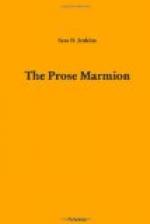“My Lord, I can ill interpret what I say. All night I was disturbed in my sleep, as if by workmen forging armor. At dawn, hearing the drawbridge fall, I looked from a loophole and saw old Bell-the-Cat, wrapped in sables, come from Tantallon keep. The wind blew aside the fur mantle, and I beheld beneath it, a suit of rusty mail, which I am sure must have done bloody work against Saracen and Turk. Last night that armor did not hang in Tantallon hall. Next, I saw Old Cheviot, Douglas’s matchless steed, led forth, sheathed in bright armor. The Palmer sprang to the saddle, Lord Angus wished him speed, and as he bowed and bent in graceful farewells, I could but think how strongly that Palmer resembled the young knight you overthrew at Cottiswold.”
A sudden light broke upon Marmion. “Dastard! fool! I, to reason lost, when I rode to meet a fay, a ghost, on Gifford’s moor. It was this Palmer fiend, De Wilton in disguise, I met. Had I but fought as is my wont, one thrust had placed him where he would never cross my path again. Now he has told my tale to Douglas. This is why I was treated with scorn. I almost fear to meet my Lord Surrey. I must avoid the Lady Clare, and separate Constance from the nuns.
“O, what a tangled web
we weave,
When first we practice
to deceive!
A Palmer too!—no
wonder why
I felt rebuked beneath
his eye:
I might have known there
was but one
Whose look could quell
Lord Marmion!”
Stung with these thoughts, he urged on his troop, and at nightfall reached the Tweed, closing the march of the day at Lennel convent. Here Marmion, his train, and Lady Clare, were given entertainment for the night.
“’Next morn, the
baron climb’d the tower,
To view afar the
Scottish power,
Encamped
on Flodden edge:
The white pavilions
made a show,
Like remnants
of the winter snow,
Along
the dusky ridge.
Lord Marmion look’d:—at
length his eye
Unusual movement
might descry.
Their ranks inclining,
wheeling, bending,
Now drawing back,
and now descending,
The skilful Marmion
well could know,
They watched the
motions of some foe.”
Even so it was. The Scots from Flodden ridge saw the English host leave Barmore-wood and cross the river Till. Why did Scotland’s hosts stand idle? What checked the fiery James, that he sat inactive on his steed and saw Surrey place the English army between Scotland and Scotland’s army? O Douglas! O Wallace! O Bruce! for one hour of thy leadership to rule the fight! The precious hour passed,—the hour when in crossing the river, the English might have been destroyed.
“From fate’s dark
book a leaf been torn,
And Flodden had been
Bannockbourne!”
Fitz-Eustace called to Blount, and both to Marmion,
“‘Lord Surrey’s o’er the Till!’”




